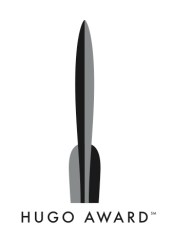Book Review: The Fall by Guillermo del Toro and Chuck Hogan
By Lisa Damian at Seattle Pi

The Fall is the second installment in the vampire trilogy by Academy Award winning director Guillermo del Toro and bestselling thriller novelist Chuck Hogan. The two authors had readers on the edge of their seats with the first book in the series, The Strain, and this second book reads with the same spine-tingling suspense mixed with gritty vampire horror as the first.
Breaking from the recent flow of the vampire genre which often casts blood-drinkers as romantically inclined yet tormented soulful heroes, del Toro and Hogan return to the image of vampire as parasitic monster with a nearly insatiable thirst for human blood. In this new trilogy, the vampire population spreads like a virus, threatening world domination and the total subjugation of humanity as an animal food source.
Read More here
Announcing the 2010 Hugo Award Winners!
via Tor

The Hugo Awards have been given since 1953, and every year since 1955, by the annual World Science Fiction Convention (the “Worldcon”). Finalists are nominated by members of the previous Worldcon and of the upcoming one; winners are selected by members of the upcoming one.
Best Novel
Presented by Kim Stanley Robinson
- The Windup Girl, Paolo Bacigalupi (Night Shade) (tie winner)
- The City & The City, China Miéville (Del Rey; Macmillan UK) (tie winner)
- Boneshaker, Cherie Priest (Tor)
- Julian Comstock: A Story of 22nd-Century America, Robert Charles Wilson (Tor)
- Palimpsest, Catherynne M. Valente (Bantam Spectra)
- Wake, Robert J. Sawyer (Ace; Penguin; Gollancz; Analog)
Read More here
The Pirate Code of Children’s Literature
by Stacy Whitman for Science Fiction and Fantasy Writer’s of America

There seems to be a lot of confusion in the SFF community among those unfamiliar with children’s literature about just what is children’s literature and what is young adult. Outside of genre circles, when I introduce myself as a children’s book editor, most people assume I edit picture books—and they often also think that means I’m a copyeditor, but that’s another story for another day. Inside of genre circles, “YA” seems to be taking hold as a catch-all term for anything written for anyone under 18, at least for people with whom I get into discussions at cons. Being at cons, sometimes these “discussions” get rather heated! When “YA” SF award nominees come out, the books on the short lists might be either middle grade or young adult—for example, Garth Nix’s Keys to the Kingdom series, solidly middle grade, was nominated for the 2007 Locus Award. Very seldom do these awards have a “children’s” category, so “YA” becomes the default.
The exact ages of any particular children’s book publisher’s anticipated audience might vary slightly from the following list, but here’s a general breakdown of children’s book age categories as they’re used by publishers, booksellers, and librarians who work with children and teens. They’re more like guidelines.
- Middle grade (MG; solid children’s novels, like Ramona Quimby, Age 8, and Harry Potter and the Sorcerer’s Stone): 8 to 12
- Young adult (YA): 12 to 18, or, some would argue, simply 12 and up, given that so many adults are reaching over to YA for enjoyable reading.
There’s a huge difference between the developmental levels of kids at 8 and 12, and a bigger difference between a 12-year-old’s developmental level and an 18-year-old’s. Publishers place books into age groups both for marketing purposes and to ensure that librarians, teachers, parents, and booksellers (the gatekeepers) can judge whether a book will meet their needs.
Read More here
Definitely check out the rest of the Hugo winners, the list includes movies and TV shows as well as short stories, books and art. And I think it’s really interesting to see how age groups (and genres) are defined. YA books seem to have more flexible boundaries, especially since more and more adults are reading YA books (like Twilight or The Hunger Games); that’s something the author discusses in the rest of the article.
What do you think of the Hugo Award winners? What do you think about YA books?
